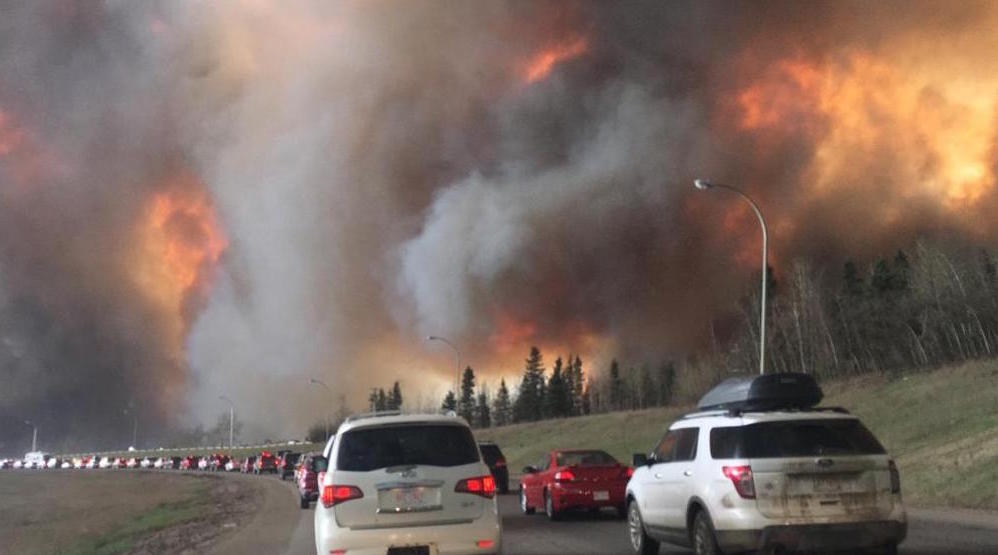Young Swedish activist Greta Thunberg, who spoke to the UN climate summit in New York this week, has said: “I want you to act as if our house is on fire. Because it is.” One thinks of the carnage at Fort McMurray in 2016 where the houses were on fire after a massive blaze swept through the area burning 590,000 hectares of forest, destroying much of the city and forcing the evacuation of 88,000 people.
Phoney war
Many people hoped that climate change would be a top issue in the Canadian federal election. But what we have mainly seen so far is war rooms for the Liberal and Conservative parties vying to show why the other side’s leader is unworthy and unfit to govern. It is as if our political system is incapable of mobilizing on anything beyond nasty short-termism.
Paris promises
The government of Justin Trudeau promised at the Paris climate summit in 2015 that by 2030 Canada would reduce greenhouse gas (GHG) emissions by 30 per cent below their levels back in 2005. This is in keeping with a target in Paris to keep average global temperatures from rising no more than 2 C. But at Paris low-lying island nations warned that a two degree increase would doom them to disappearance. So, the leaders in Paris agreed that their aspirational goal would be to limit the temperature increase to 1.5 degrees.
Scientists from the Intergovernmental Panel on Climate Change (IPCC) agree that a temperature rise of two degrees would see a rapid evacuation of people from the tropics and havoc in low-lying coastal area caused by rising sea levels. But to hold the increase to 1.5 degrees, they say, means that global GHG emissions must fall much further — a 45 per cent reduction by 2030, and to a net of zero by 2050.
Carbon tax
The Trudeau government continues to insist that Canada is on track to meet its two degree commitment at Paris. But the government’s own parliamentary budget office warns that the government’s plan will get Canada only part of the way there. The Liberal centrepiece for combating GHG emissions is a carbon tax on fossil fuels which the government says will encourage a market shift to renewable sources of energy. But experts say that the carbon tax at its existing level will have only a minimal effect on consumption.
In any event, benefits that may arise from the levy are more than negated by the effect that expanded production in Alberta’s oil sands will have upon GHG emissions. That production is supported by both the Liberal government and the Conservative opposition.
Party platforms
The Liberals have not yet released a climate platform in this election campaign and may simply base their policy on what they are already doing. Cam Fenton, the communications and strategy manager for 350 Canada, says in The Tyee: “I think [the Liberals] have an opportunity to articulate a much bolder vision. The problem is they’re still operating as if we have 30 or 40 years to tackle this crisis…”
Conservative Leader Andrew Scheer has denounced the carbon tax and says the Conservatives would rescind it. He says they would also implement a policy requiring large GHG polluters to pay into a research and development fund for green technology. The Conservative platform contains no targets for GHG emissions.
Cam Fenton of 350 Canada says, “It’s a plan to expand fossil fuel production. It’s a plan to blow past climate targets… They’re talking about the idea of inventing our way out of this crisis without ever having to address the fact that we’re digging up and burning so many fossil fuels.”
NDP and Greens
The NDP and Green parties have both released climate action plans. The NDP promises to support a carbon tax and to achieve a reduction of emissions by 2030 which would be a 37 per cent below emissions in 2005, seven percentage points beyond the Liberal target. The NDP also promises to support a just transition for workers in fossil fuel industries by spending $15 billion to help create 300,000 jobs in industries involved in the shift to a low-carbon economy.
The Green Party platform promises a 60 per cent reduction in GHG emissions below 2005 levels by 2030, a target far more ambitious than that of the Liberals. The plan also promises to keep a carbon tax, and to create millions of jobs by ensuring that all Canada’s buildings are carbon neutral. But the Green’s plan is short on detail about implementation.
Neither the NDP nor the Green parties have any realistic chance of forming government. But in a minority Liberal government in which one or both of the smaller parties lend strategic support, there would be some chance of progress on climate change. The Liberals, however, would have to be prepared to move beyond their tepid incrementalism.
The street
The other significant factor is the street. If Canadians are ready to support much more dramatic action on climate change, that sentiment will somehow have to be mobilized. There are any number of organizations working toward this end. For them to achieve anything, many of us will have to get off the couch and support them. Citizens can push politicians to pass better laws. If the house is burning, surely that is what we must do.
Dennis Gruending is an Ottawa-based author and blogger and a former member of Parliament. See his website for his latest book, Speeches That Changed Canada.
Image: DarrenRD/Wikimedia Commons




